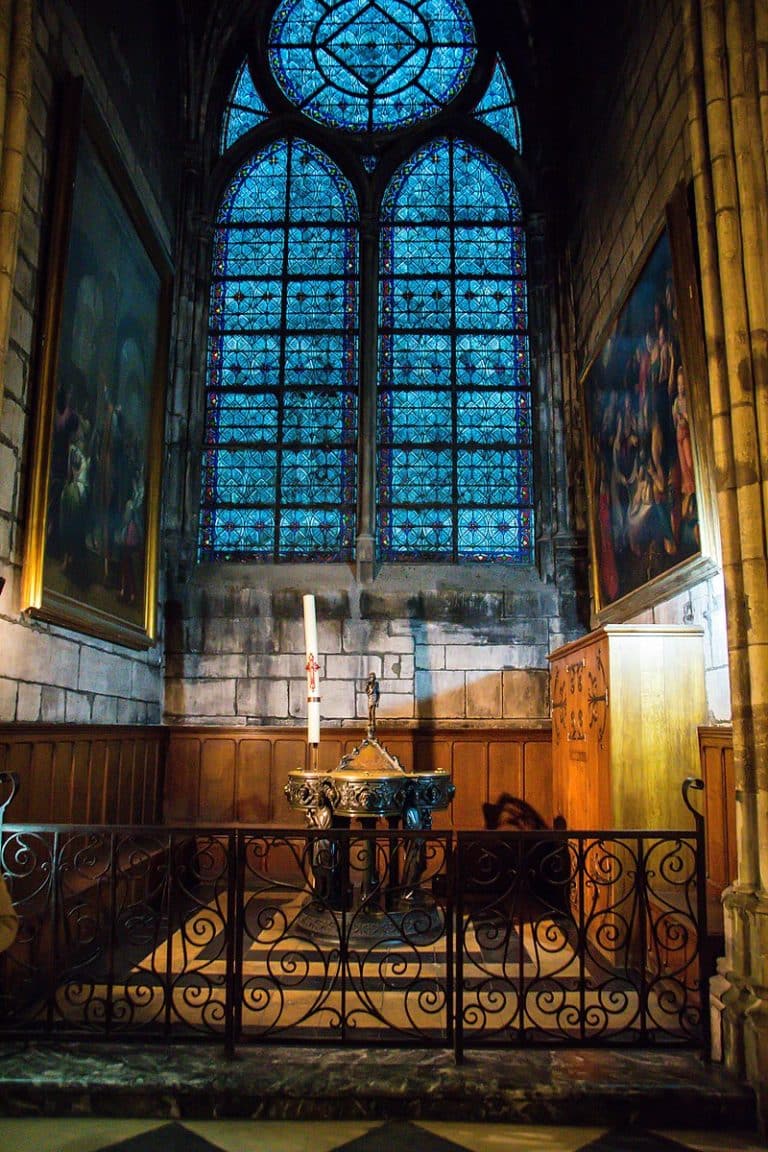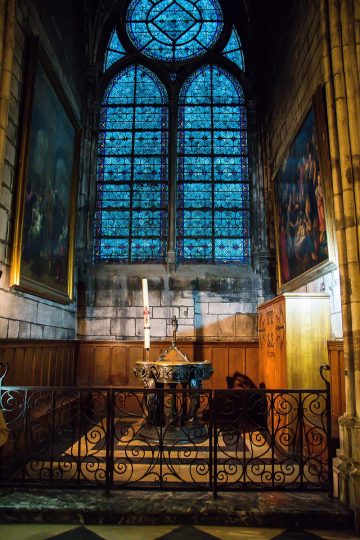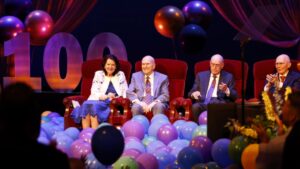A familiar trope of the travelogue testimony is a narrative of a visit to a distant ward or branch, and how that meeting felt wonderful, even if (or especially if) the speaker could not understand the local language. This feeling is proof that the Church is true. Sometimes the congregation also hears a contrasting experience about how uncomfortable the traveler was in a Cathedral or other non-LDS sacred space and meeting. I feel reasonably confident that any readers with ward members wealthy enough to travel have heard some version of this anecdote.
To be perfectly fair in what is about to become a critique, I have felt similar feelings of comfort or discomfort. As an American living in France it was comforting to go to Church and hear familiar tunes, participate in familiar rituals, and follow a familiar schedule even if the text, language and personal experiences of the members were not American. It felt like I was home in a time when I felt so incompetent and flustered over the simplest things, like buying stamps or a metro pass. I also went to Mass a handful of times, in part because I was lonely and bored on Sunday with nothing to do all afternoon and at least with more church I’d be around people. The surroundings were beautiful but very unfamiliar, with winking candles and the smell of incense and echoing stone walls. I speak French well, but apparently not well enough to follow chanting and I don’t know enough about Mass to really guess what was going on. I felt very uncomfortable, and it wasn’t just the hard pew.
The scriptures teach us that the Holy Ghost is a spirit of comfort and a spirit of truth.
“And I will pray the Father, and he shall give you another Comforter, that he may abide with you for ever; Even the Spirit of truth; whom the world cannot receive, because it seeth him not, neither knoweth him: but ye know him; for he dwelleth with you, and shall be in you . . . But the Comforter, which is the Holy Ghost, whom the Father will send in my name, he shall teach you all things, and bring all things to your remembrance, whatsoever I have said unto you. Peace I leave with you, my peace I give unto you: not as the world giveth, give I unto you. Let not your heart be troubled, neither let it be afraid.”
(John 14: 16-17, 26-27)
We can receive a witness of truth by the feelings that the Holy Ghost gives us. People who have experienced this often describe that feeling as one of warmth, peace, stillness, happiness – comfort! And we can also receive warnings when we encounter situations that are dangerous spiritually or physically. Those feelings are often the opposite – an uneasiness, a desire to leave, a yucky feeling in our stomachs.
I think, however, that it can be too easy as members to assume that feelings of comfort or discomfort come from the Holy Ghost, and therefore our responses to those feelings are righteous ones. As a white person, it can be very uncomfortable to confront systemic racism, or to have a non-white person express pain and oppression at the hands of white people. The same is true of men listening to the experience of women within a patriarchy, or straight people listening to the experience of LGBTQ+ folks. It can be true for Mormons encountering other faith traditions, or people of any country encountering foreigners. Those feelings of discomfort can seem a lot like warnings from the Holy Ghost – maybe you want to leave, or you feel a clench in your gut, or just uneasy. Similarly, we might feel comfortable around people expression political opinions we share, or hanging out primarily with people who share our skin tone or cultural background.
This is what I think we need to say loud and clear in every lesson on the Holy Ghost:
Just because you’re comfortable, it doesn’t mean the Comforter is witnessing truth. And just because you’re uncomfortable, it doesn’t mean that you’re receiving a witness of untruth or wickedness.
I did many things as a missionary that made me profoundly uncomfortable: Talking to strangers, knocking on doors, sharing my vulnerable feelings. I almost always felt a desire to run away instead. That doesn’t mean what I was doing was displeasing to God or inconsistent with truth. I’m an introvert and in any case, proselytizing violates a lot of cultural norms around minding your own business and religion being a private matter.
I have also done or said things in my life that at the time comfortable, but which I now cringe to think of. “The Church isn’t sexist” is an example that springs to mind – it was the easy thing to say and it fit with what everyone around me wanted to hear. That doesn’t make it true. In middle school I was in the class production of “Peter Pan” complete with being a member of the “Indian” chorus who sang a song with the following lyrics: “Guk-a-bluk waaaah—hooo! Ug a wug ug a wug waahhh.” The choreography, costuming and makeup are as appalling as you might be imagining. I was uncomfortable only because of stage fright. That doesn’t mean God loves cultural appropriation and demeaning stereotypes.
I don’t have an easy answer for how to discern between the Comforter witnessing truth, and our own comfort with the familiar and the easy. I only want to suggest as we enter a new year at Church that we push a little harder on those questions in our classes and talks.






7 Responses
So true, oh, so true
“Just because you’re comfortable, it doesn’t mean the Comforter is witnessing truth. And just because you’re uncomfortable, it doesn’t mean that you’re receiving a witness of untruth or wickedness.” Yes! Amen! I had a Relief Society president who was very uncomfortable with any discussion of nuance or a hint of disagreement, especially if it pointed to systemic issues in the Church. She asked the RS sisters not to speak if they weren’t agreeing with the teacher and moving the lesson forward. And she told me personally that every time I speak, the spirit leaves the room. I was moving a few weeks later and I didn’t go back to the RS in that ward. Feeling uncomfortable is not about untruth or wickedness!
Some years ago I had the opportunity to be in Budapest, Hungary to begin training in an internationally well known system of music education. The friends that I was with and I decided to go to Budavari Hill on the Buda side of the city and visit the sights. One friend who had been to Budapest many times suggested that we go to the ancient St. Stephen’s Cathedral up there on the hill. As we walked in we noticed that a short daily mass (in Latin no less!) was about to start. As the group of us were all professional musicians and two of us had performed many requiem masses we thought that sitting through the service would be a wonderful opportunity both musically and as a special spiritual experience. One of our group absolutely refused because she (loudly) said that as this was a Catholic worship service there was absolutely nothing that would induce her to stay and listen to false doctrine preached through word and song. Fortunately, most people didn’t understand her tirade because it was in English, but the rest of us were absolutely mortified by her outburst. Because we knew by then not to try to reason with her we left her to go do her own thing while we attended mass.
The mass used the old plainchant melodies from the Middle Ages, and as that beautiful music swirled around and reverberated on the ancient stones of that church those of us who’d stayed were so filled with God’s glory and we wept even if we didn’t understand the spoken Latin. At the end of our trip those of us who went to mass decided that it had been the high point of our entire visit to Hungary. Even now I can see that cathedral and hear that glorious sacred music in my mind. I have been blessed to play in many different kinds of houses of worship as a musician and the vast majority of the times I have felt such a spirit of sacredness in these places that I don’t always feel in an LDS chapel. Anyway, that’s my personal experience.
Brilliant, Em. As always.
During our last Fast and Testimony Meeting, an old man shared his testimony of walking into the many churches and cathedrals on his trip to Europe. He stated that he did not feel the Spirit in any of them. Every building was dark, lifeless and cold. It was not until he returned to Utah and attended the Temple did he feel the overwhelming Spirit of God.
I have lived in various parts of the world and have sat in the pews of these magnificent holy buildings. I felt warmth and light and the presence of the Spirit in every one.
Does the Holy Spirit only reside in our temple? Only with our religion? I think not. I am happy for any opportunity to sit and listen, to sit and feel, to sit and wonder, in any house, in any cathedral, in any part of the world. The Spirit has no boundaries.
Several now deceased members of my ward owned properties in Hawaii and traveled there frequently. From their obligatory travelogue testimonies, beginning with a loud “aloha”,I was left to wonder why they returned to Utah since Hawaii was clearly the source of all positive spiritual experiences for them. I have only positive thoughts of Hawaii and am not disparaging the lovely state in any way.
EM, this post -1000x over! We need to put this on the front page of every publication, write in in the air in sparklers, and drag it on a banner behind a bi-wing airplane.
We talk about puppies, kittens and babies having “milk comas” when they top of their dinner and with bellies full, comfortable and warm, they inevitably doze off. I think the Saints get “milk comas” when they feel even a little of the good churchy vibes- when they are comforted by culture or even by the HG, and then they go into a mental “milk coma” and slip in whack-a-doodle stuff “under the influence” so to speak. I highly suspect that’s how polygamy came about, how the patriarchy remains, how women are appeased in subservient roles, how Deserted Book kitsch passes for art, how people say the stupidest things in talks with a straight face, and how a lot of mean things are done that hurt our fellow brothers and sisters.